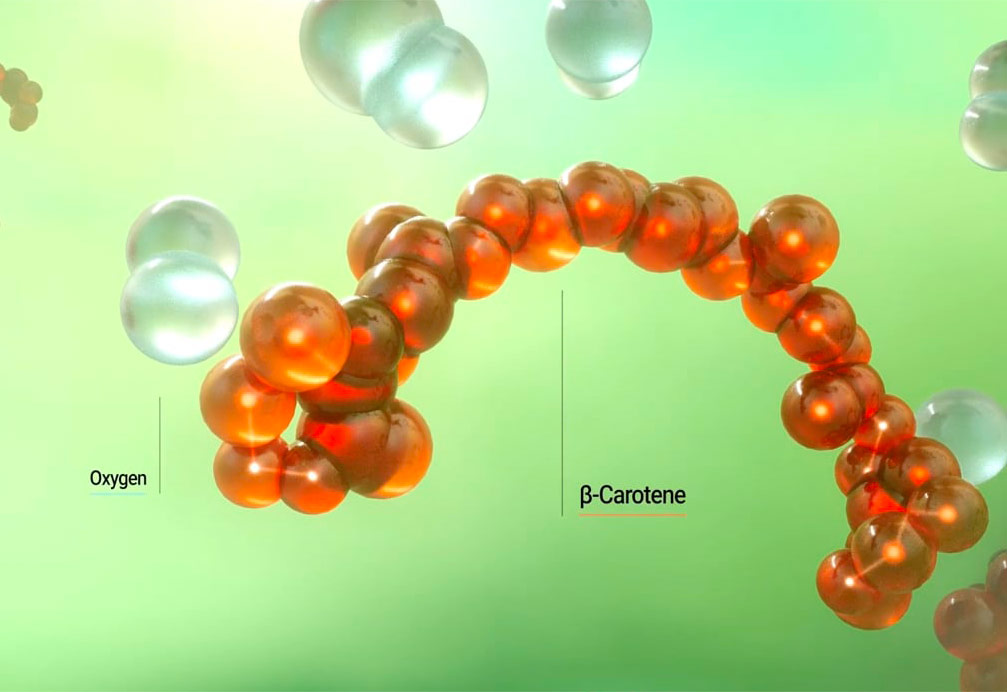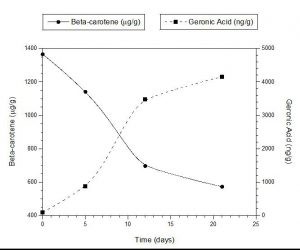Science has shown that β-carotene, has benefits beyond being a source of Vitamin A, but the benefits have been difficult to reproduce.
Avivagen has changed this.
Did you know?
OxC-beta Livestock has undergone extensive field trial and customer evaluations in dairy cattle, pigs and broiler poultry at research centres and customer facilities around the world. The results of the trials demonstrate that OxC-beta Livestock provides clear benefits for producers.
The Evidence: Trials
OxC-beta Livestock has undergone extensive field trial and customer evaluations in dairy cattle, pigs and broiler poultry at research centres and customer facilities around the world. Results from these trials demonstrate that OxC-beta Livestock supports productivity by enhancing feed consumption. The bottom line is animals receiving OxC-beta perform better.
40+ clinical and field trials

In the 1990s, Avivagen’s founding scientists were onto something at the National Research Council of Canada. They were investigating the origin of β-carotene’s activity beyond being a source of vitamin A. The idea was to check out the products of the spontaneous oxidation of β-carotene.

The team realized that when β-carotene spontaneously oxidizes with oxygen, it forms a complex product mixture in which the main product is composed of β-carotene-oxygen copolymers. As the oxidation reaction progresses, the growing polymers release small norisoprenoid breakdown compounds, also known as apocarotenoids, which are known for their aromas and flavours. Several norisoprenoid compounds are approved as GRAS (Generally Recognized As Safe) flavoring agents for human use [1].



Commercially produced, fully oxidized β-carotene (OxBC) is the key ingredient in OxC-beta™ products. The benefits of OxBC are seen in both OxC-beta™ Livestock and pet supplements. The absence of both β-carotene and vitamin A in OxBC provides compelling evidence that the β-carotene oxidation products are the real source of biological activity beyond vitamin A. This leads to a fuller understanding of the potential of β-carotene. The oxidation products occur naturally in many fruit and vegetable products, which makes them a plausible contributor to the human health benefits associated with dietary fruit and vegetable consumption.
β-Carotene and the more than 600 other members of the carotenoid family are characterized by an extended system of conjugated carbon-carbon double bonds that provide intense colour and make the compounds highly susceptible to reaction with oxygen in air.
Natural Occurrence of OxBC in Plant Materials
The β-carotene copolymer compound, as well as other carotenoid copolymer compounds, and their norisoprenoid breakdown products are ubiquitous, being formed naturally in variable and often significant quantities in carotenoid-containing plant materials, especially during processing, such as drying, and during storage. This is simply the result of exposure to air. Naturally occurring examples relevant to livestock feeds include alfalfa, grass and seaweed products, and in human nutrition, carrot and tomato powders [4].
Illustration of the effect of dehydration and storage on β-carotene oxidation in carrots. The formation in dehydrated, powdered carrot of geronic acid, a marker of β-carotene oxidation and the associated copolymer products, can be seen to be closely linked to the concomitant loss of β-carotene.
Corroboration of the natural occurrence of OxBC has been provided independently by Schaub, Beyer and co- workers [5]. In accounting for the loss of β-carotene in an extensive variety of β-carotene plant crop foods during storage, this group reported that spontaneous oxidation of β-carotene leads to the concurrent formation of β-carotene copolymer compounds as the major product.
OxBC is the Real Source of Non-Vitamin A Immune Supporting Effects
Avivagen manufactures OxBC (Oxidized β- Carotene) by allowing pure β-carotene dissolved in a solvent to react fully with oxygen from air. OxBC is composed entirely of oxidation products comprised of β-carotene-oxygen copolymers and their norisoprenoid breakdown products. No β-carotene remains, no vitamin A is formed and there is no vitamin A activity. OxBC has diverse activities including supporting immune function, and enhancing flavour. Avivagen has formulated multiple products to harness the diverse activites of OxBC, in OxC-beta Livestock (feed additive) for enhancing feed palatability and in OxC-beta Complex to support immune function (companion animals). [3].
Studies in livestock and dogs provide clear and consistent evidence of the benefits of OxBC that were previously ascribed to β-carotene. This discovery explains why β-carotene is unable to fulfil this function itself unless it first itself has undergone spontaneous oxidation to form OxBC. In poultry and swine, flavor enhancement benefits are obtained at just low parts-per-million levels of OxBC in finished feed, well within the limits of levels of β-carotene were it available from plant sources.
Avivagen is now providing three products — OxC-beta™ Livestock, a feed additive to enhance palatability of livestock feeds, and two pet supplements using OxC-beta Complex in Vivamune™ and Dr Tobias All-in-One Dog Chews.
Research articles on OxBC have been published in several highly-respected scientific journals. See for yourself below.
- Burton, G. W.; Daroszewski, J.; Nickerson, J. G.; Johnston, J. B.; Mogg, T. J.; Nikiforov, G. B. ß-Carotene autoxidation: oxygen copolymerization, non-vitamin A products and immunological activity. J. Chem. 2014, 92, 305-316. DOI: 10.1139/cjc-2013-0494 (Open Access).
- EFSA Scientific Opinion on the safety and efficacy of beta‐carotene as a feed additive for all animal species and categories. EFSA Journal 2012, 10, 2737 (Open Access).
- Johnston, J. B.; Nickerson, J. G.; Daroszewski, J.; Mogg, T. J.; Burton, G. W. Biologically active polymers from spontaneous carotenoid oxidation. A new frontier in carotenoid activity. PLoS ONE 2014, 9, e111346 (Open Access).
- Burton, G. W.; Daroszewski, J.; Mogg, T. J.; Nikiforov, G. B.; Nickerson, J. G. Discovery and Characterization of Carotenoid-Oxygen Copolymers in Fruits and Vegetables with Potential Health Benefits. J Agric Food Chem 2016, 64, 3767-3777 (Open Access).
- Schaub, P.; Wust, F.; Koschmieder, J.; Yu, Q.; Virk, P.; Tohme, J.; Beyer, P. Nonenzymatic beta-Carotene Degradation in Provitamin A-Biofortified Crop Plants. J Agric Food Chem 2017, 65, 6588-6598 (an abstract of the article is available at: https://pubs.acs.org/doi/abs/10.1021/acs.jafc.7b01693).
The β-carotene copolymer compound, as well as other carotenoid copolymer compounds, and their apocarotenoid breakdown products are ubiquitous, being formed naturally in variable and often significant quantities in carotenoid-containing plant materials, especially during processing, such as dehydration, and during storage. This is simply the result of exposure to air. Naturally occurring examples relevant to livestock feeds include alfalfa, grass and seaweed products, and in human nutrition, carrot and tomato powders [4].
Illustration of the effect of dehydration and storage on β-carotene oxidation in carrots. The formation in dehydrated, powdered carrot of geronic acid, a marker of β-carotene oxidation and the associated copolymer products, can be seen to be closely linked to the concomitant loss of β-carotene.

Corroboration of the natural occurrence of OxBC has been provided independently by Schaub, Beyer and co- workers [5]. In accounting for the loss of β-carotene in an extensive variety of β-carotene plant crop foods during storage, this group reported that spontaneous oxidation of β-carotene leads to the concurrent formation of β-carotene copolymer compounds as the major product.

